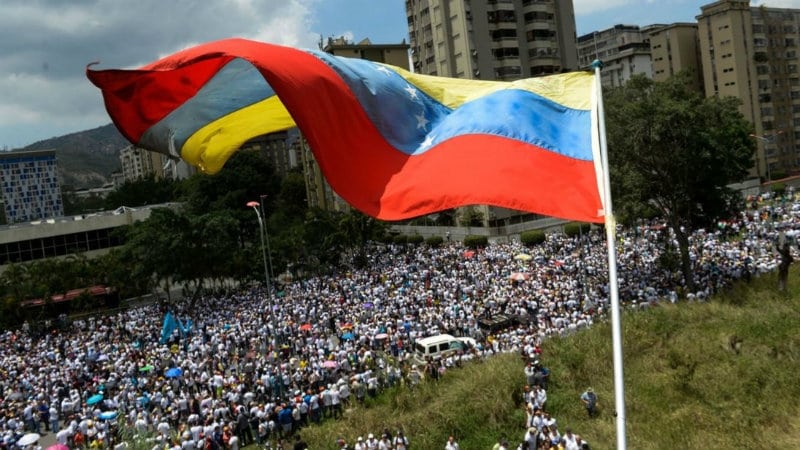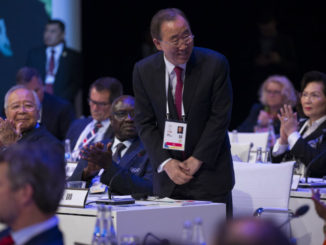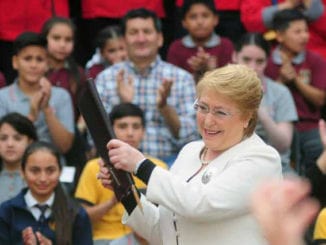
CARACAS – Thousands of Venezuelans dressed in white shirts and marched in silence towards the headquarters of the Catholic archdiocese in Caracas to pay their respects to the 20 people killed in anti-government protests over the past three weeks.
Opposition leaders are planning to bring the struggling country to a halt on Monday by urging protesters to block roads.
For the first time since the unrest began, demonstrators were able to pass through several pro-government districts in Caracas without resistance from security forces.

After heated negotiations with security forces blocking their way on Saturday, the protesters were allowed to complete their march. Police fired tear gas to disperse a group of protesters trying to join the march but there were no reports of violence, deaths or injuries.

They have been protesting almost daily – angered by triple-digit inflation, widespread shortages of food and medical supplies, and the policies of President Nicolas Maduro.
Three weeks of protests have seen riot police and pro-government vigilantes take on opposition protesters throwing stones and Molotov cocktails.

“We want free elections, we want to get rid of this corrupt government,” said Iomira Barrios, an environmental consultant who says she could no longer find work. “Right now people are willing to fight, because they have declared a dictatorship and we cannot allow it.”
The demonstrators want elections to be called immediately in Venezuela, and for dozens of jailed government opponents to be released. Polls suggest 70% of Venezuelans disapprove of Mr. Maduro’s socialist presidency, but his term in office is not due to end until 2019.

Opposition to the government of President Nicolas Maduro has been growing, even among the poor who were the strongest supporters of his predecessor and mentor Hugo Chavez.
On the other hand, Mr. Maduro says the protests are part of a US-backed coup plot, while other government leaders claim the violence has been generated by right-wing opposition forces who are working with criminal gangs in an attempt to remove them from power.

Economic crisis worsens
Once generous social programs funded by high oil prices have been curtailed as the world oil price fell and the economy has spent three years in recession. Oil accounts for 95 percent of foreign-currency earnings.
There are shortages of food and basic goods, leading to long lines outside shops as people wait to buy what little there is available.
In its World Economic Outlook, the International Monetary Fund (IMF) wrote “Venezuela remains mired in a deep economic crisis.” Unemployment has risen from 7.4 percent in 2015 to 25 percent this year and could rise to 28 percent next year.
Inflation may reach 720 percent this year, according to the IMF and could rise to 2,000 percent by 2018.
The opposition, via National Assembly President Julio Borges, has written to leading international banks, including Deutsche Bank, warning them against supporting the Maduro government.
 Looting has been a problem in some area of the capital, Caracas.
Looting has been a problem in some area of the capital, Caracas.
“The national government, through the central bank, is going to try to swap gold held as reserves for dollars to stay in power unconstitutionally,” said one letter sent Thursday to John Cryan, the CEO of Deutsche Bank. “I have the obligation to warn you that by supporting such a gold swap you would be taking actions favoring a government that’s been recognized as dictatorial by the international community.”
General Motors closes plant
After 69 years in business in Venezuela, US car giant General Motors shut down its operations after authorities seized the plant and took its vehicles, the company announced last Thursday.

The factory was “unexpectedly taken,” according to a statement from GM. The company “strongly rejects the arbitrary measures taken by the authorities and will vigorously take all legal actions, within and outside of Venezuela, to defend its rights,” the Detroit-based automaker said in a statement.
In a nation of 30 million people, only 293 cars were sold in March, according to figures from Bloomberg. Ford still has a plant in Venezuela, although it is not operating. Toyota and Fiat Chrysler are still operating.



